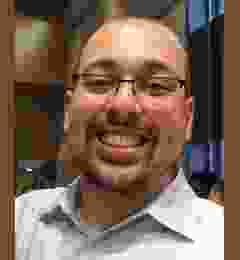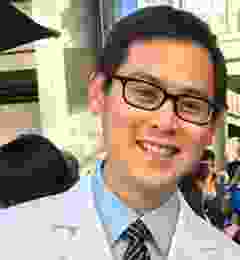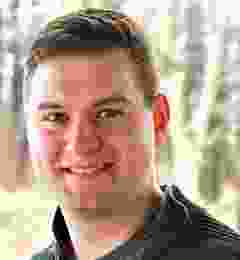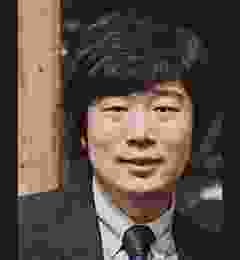Matriculating 2016
-

Nicholas Bolden
Nicholas Bolden graduated from the University of Maryland, Baltimore County in 2016 with a BS in biochemistry. Before matriculating into UMass as an MD/PhD candidate the same year, he worked in the lab of Dr. Michael Summers, studying the structural biology of HIV-1.
His current interest is in addiction neurobiology, and he is currently working in Dr. Haley Melikian’s lab studying regulation of the dopamine transporter. He has rotated in Dr. Patrick Emery’s lab, studying circadian rhythm and in Dr. Nathan Lawson’s lab, studying angiogenesis. -

Kevin M. Gao
Kevin M. Gao is a graduate of Tufts University with a B.S. in Biochemistry with a minor in Mathematics. In his Sophomore year at Tufts, Kevin discovered his love of immunity while working on the molecular pharmacology of the CCR6/CCL20 immuno-chemotactic axis with Dr. Alan Kopin at Tufts Medical Center. Following this undergraduate research experience, he continued to pursue his interest in immunology as a research associate in the lab of Dr. Ramnik Xavier at the Broad Institute, where he studied the role of autophagic proteins on the pathogenesis of Inflammatory Bowel Disease. In 2016, he matriculated into UMass Chan Medical School’s Medical Scientist Training Program in order to pursue a career in academic medicine and immunology.
He has since finished rotations with Dr. Beth McCormick on cellular processing and localization of Salmonella secreted effectors, Dr. Leslie Berg on the regulatory role of the kinase ITK on T cell signaling, Dr. Read Pukkila-Worley on the regulation of immune responses by fatty acids in C. elegans, Dr. Ann Marshak-Rothstein on the role of Th1 T cells in DnaseII deficiency mediated auto-inflammation, and Dr. Kate Fitzgerald on the role of constitutive STING activity on central and peripheral T cell development.
Kevin is mentored by his thesis advisors, Dr. Ann Marshak-Rothstein and Dr. Kate Fitzgerald; his research interests are in the communication between innate immune sensors and adaptive immune cells in auto-immune and auto-inflammatory diseases. He is currently investigating the role of the cGAS-STING pathway in T cells and implications of STING activation on auto-immune disease. -

Kevin W. O'Connor
Kevin received a B.A. from Bowdoin College in 2011. Following graduation, Kevin worked in the laboratory of Dr. Alan D’Andrea at the Dana-Farber Cancer Institute in Boston, where he studied avenues for personalized therapy in patients with DNA repair-deficient cancers. After deciding to pursue academic medicine, Kevin attended the M.S. in Medical Sciences program at Boston University School of Medicine, where he completed his Master’s thesis titled “Molecular Determinants of sensitivity to poly (ADP-ribose) polymerase inhibitors in epithelial ovarian cancer” and served as a teaching assistant for the Biochemistry and Cell Biology course.
Since matriculating into the MD/PhD program at UMassMed, Kevin has completed rotations with Dr. Michelle Kelliher, Dr. Michael Lee, and Dr. Wen Xue. His thesis work in the lab of Michelle Kelliher so far has focused on better defining leukemia initiating cells (L-ICs) in pediatric T-cell acute lymphoblastic leukemia. L-ICs are resistant to chemotherapy and thus thought to be responsible for relapse in T-ALL. By leveraging single-cell RNA sequencing (scRNA-seq) of pre-leukemic and fully transformed thymocytes, we have identified a cluster of cells with genetic features consistent with a stem-like population. Work is currently underway to establish the contribution of these genes to L-IC activity in our murine T-ALL model. We ultimately hope to identify a therapeutic target in L-ICs to prevent relapse. -

Kenley Preval
Kenley Preval is a graduate of Curry College with a B.A. in Biology. Prior to enrolling in UMassMed as an MD/PhD Candidate, he conducted research at Curry College where he explored the metabolic interactions, inhibition/induction of specific signal transduction pathways and transcription factors evinced via application of strawberry derived phytochemicals onto TD47 breast cancer cells. He also completed the UMass Chan Medical School 2014 Summer Undergraduate Research Program in Dr. Gregory Pazour's lab, which enabled him conduct research that highlighted the embryogenic/morphogenic roles of the primary ciliary trafficked protein, IFT20, in early mouse development of renal vesicles, tubules and the nephric duct of the mesonephric kidney. In 2015, he joined Dr. Rosalind Segal's lab (through the Harvard University Graduate School’s Research Scholar Initiative Program) at the Dana Farber Cancer Institute. His research focused on the capacity of sensory neurons, derived from the dorsal root ganglia, to change morphology from bipolar to pseudounipolar via formation of a T-junction which is hypothesized to attenuate pain.
Kenley has rotated in Dr. Fitzgerald’s lab where he investigated potential molecular structures that may influence macrophage NLRC4 dependent inflammasome activation. He has also rotated in Dr. Pazour’s lab, where he worked to devise a strategy to reveal unfounded IFT—IFT20-related-protein interactions significant for cilia assembly and localization.
Kenley will be joining Dr. Pazour’s Lab to further explore his interests, concerning the role mutated primary cilia play in the development of polycystic kidney disease as well as various other ciliopathies. -

Thomas Reimonn
Thomas Reimonn graduated summa cum laude with a B.S.E. in Chemical Engineering and a focus in bioprocessing from the University of Massachusetts Lowell in 2015. While at UMass Lowell, he worked in Seongkyu Yoon’s lab doing research in dynamic flux balance analysis and published two research papers. After graduation, Thomas worked at Biogen as an engineer, and worked on projects in computational fluid dynamics and plant optimization.
Thomas started at the UMass Chan Medical School in 2016. His interests include computational biology and rational drug design. Thomas rotated in the labs of Celia Schiffer, Phil Zamore, and Jeff Bailey before deciding to join Zhiping Weng’s lab focusing on computational biology. He plans to research the links between schizophrenia and autoimmune disease and focus on single-cell sequencing analysis. -

Samantha Tse
Samantha Tse is a graduate of Boston College with a BS in Biology. Before she matriculated as an MD/PhD candidate at UMassMed in 2016, she conducted both basic science and clinical research at the Ragon Institute in Cambridge, MA studying the prospects of HIV reactivation as a possible therapeutic mechanism under the mentorship of both Dr. Xu Yu and Dr. Mathias Lichterfeld.
Her research interests lie in host-pathogen interactions in intestinal biology. She has completed rotations in the labs of Dr. Raffi Aroian, Dr. Leslie Berg, and Dr. Beth McCormick. She is currently in Dr. Read Pukkila-Worley’s lab studying host-pathogen interactions in the model Caenorhabditis elegans. -

Jeffrey Zhou
Jeff Zhou is a graduate of Columbia University with a BA in Biochemistry and minor in computer science. He has previously performed research at Columbia with Dr. Carol Prives in the field of cancer biology and worked at the DNA methylation company EpigenDx. After matriculating in UMass in 2016, he rotated in the labs of Dr. Oliver Rando (rotation project: asymmetric histone epigenetic modifications) and Dr. Jeffrey Bailey (rotation project: single cell RNA sequencing). Currently, he is a graduate student in the lab of Dr. Kate Fitzgerald with interests in innate immunity, inflammasomes, and the genetics of autoimmune disease. He is especially interested in leveraging computational data to develop and test hypotheses about the mechanisms of human autoimmunity.






